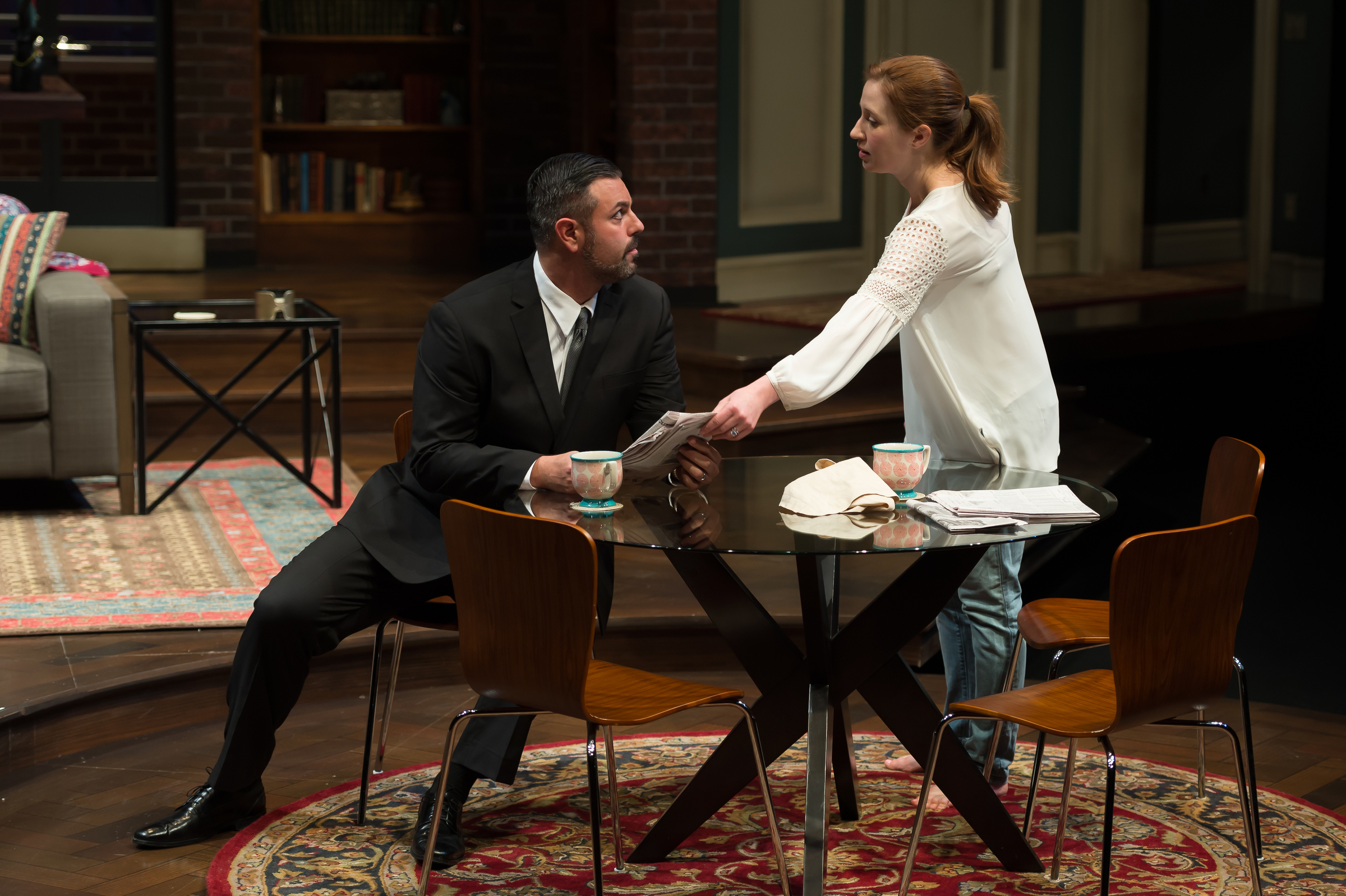
– By Cate Marquis –
Rep’s drama ‘Disgraced’ raises troubling questions but offers no answers
The Pulitzer Prize-winning play “Disgraced” focuses on being Muslim in America, but perhaps not in the way one might expect. The drama, written by playwright Ayad Akhtar and directed by Seth Gordon, is currently playing at the Repertory Theater of St. Louis’ Main Stage through until March 6.
Intelligent and provocative, “Disgraced” raises many questions about identity and faith but provides no answers. The drama is surprisingly short—a mere 90 minutes—and is presented without an intermission.
Amir Kapoor (John Pasha) is an attorney on track to make partner at his New York City law firm. Although his Pakistani immigrant parents raised him in the Muslim faith, American-born Amir no longer considers himself a Muslim, and in fact has serious disagreements with the religion. Amir has even changed his last name to one that sounds more generally South Asian.
Amir and his white American wife, an artist named Emily (Leigh Williams), are living a modern and diverse big city life, numbering among their close friends Jory (Rachel Christopher), an African American attorney at the same firm, and her husband Isaac (Jonathan C. Kaplan), a Jewish man who is a curator at the Whitney Museum.
The set represents the couple’s lovely New York apartment, which includes a balcony with a skyline view and a fireplace, above which hangs one of Emily’s paintings. In the opening scene, Emily sketches her husband Amir in their living room as they discuss art, culture, and the meaning of a painting that Emily’s portrait will reference: Diego Velázquez’s portrait of an elegantly-dressed Moorish man. Their discussion sets a tone for the play—intellectual, educated, but frank.
Their comfortable life is upset by events stemming from two seemingly inconsequential events: a nephew who asks for help for an imam accused of supporting terrorism, and his wife’s new interest in Islamic art. The events reveal hidden toxic attitudes, including Amir’s, leading to his disgrace.
In the play’s second act, simmering issues surface at a dinner party for Jory and Issac at Amir’s and Emily’s apartment. What starts out as a pleasant evening with friends descends into a discussion that reveals hidden feelings and thoughts on faith, art, race, culture, and identity.
The play raises uncomfortable issues and presents some incendiary views. This bluntness has drawn shocked reactions from some audiences and, in at least one city, people have shouted at the stage or left the theater. No such reaction happened on February 12, but it seemed that many found the play unsettling.
Playwright Akhtar is himself a Muslim American, with Pakistani immigrant parents, like the central character in the play.. Amir’s choice in how he presents himself mirrors that of other second-generation American immigrants, but his elusiveness about his background suggests he feels uneasy about prejudice, even though Amir no longer considers himself a Muslim.
All the cast are excellent, particularly Pasha, who creates a strong-willed character whose tendency to speak or act in the heat of the moment sometimes makes him his own worst enemy. Rachel Christopher also shines as Jory, the other fiery character who also provides little touches of dark comic relief. Kaplan is spot-on as Isaac, who likes to comment on Islam although he has never read the Koran. Leigh Williams does well in the difficult job of playing peacemaker Emily, who sometimes inadvertently makes things complicated.
The drama ends in a very dark place, making one wish for a third act to restore some sense of hope. “Disgraced” is not a happy play but an intelligent and questioning one that is sure to spark discussion.
© Cate Marquis